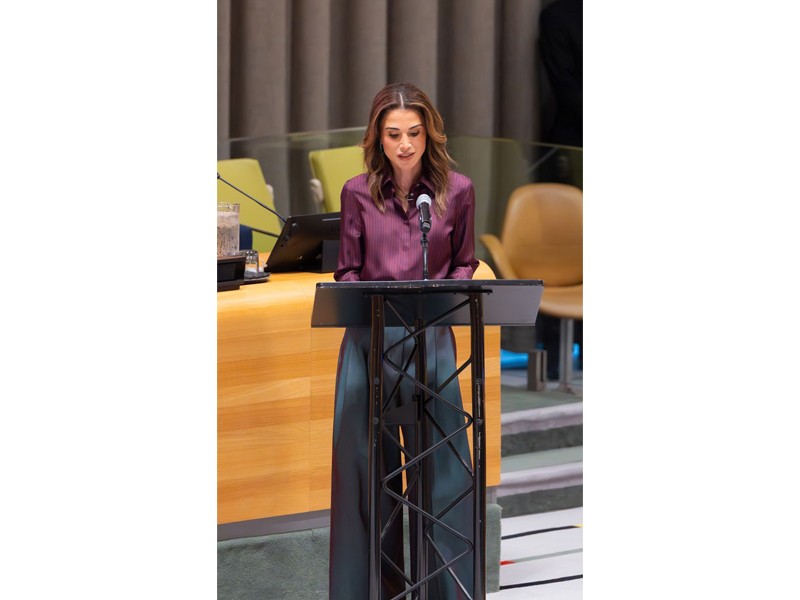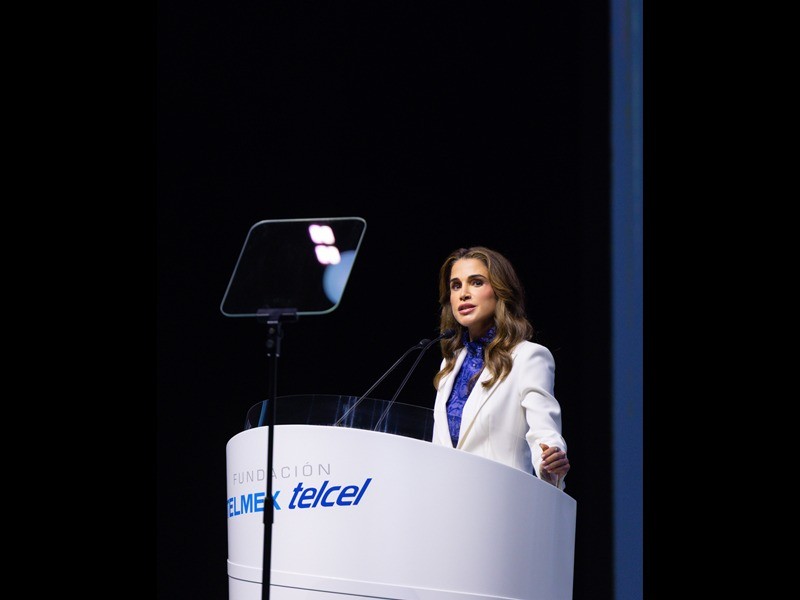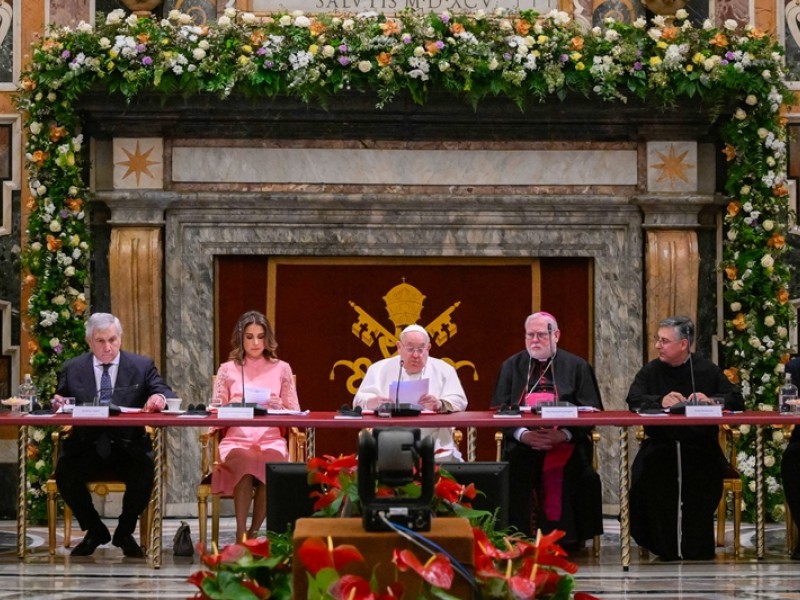Queen Rania's Speech at EBRD Annual Meeting & Business Forum Dead Sea
Thank you, Lucy, for those kind words.
And thank you all for coming together today and hosting this important meeting here in Jordan.
In more ways than one, we are a civilization on the edge. Every nation is on the brink of a future that none of us fully understands.
Some see only doom and gloom as they peer into the abyss. Others are filled with excitement as they imagine what’s waiting on the other side.
But one thing is clear: If we are to make it across the chasm, we cannot do it one small step at a time.
Living on the edge means being bold—with new partnerships, new playbooks, new resources—and, most of all, the confidence, courage, and commitment to take a flying leap.
There is much to discuss, and I won’t attempt to preview everything here.
But I’d like to highlight a few key themes we will all have to confront.
First is the pace of the oncoming change. It’s moving faster than we are. And it’s moving much faster than any revolution we’ve faced before.
It took more than 100 years to transition from farms to factories.
Yet, it could take us fewer than 10 to shift from factories to smart factories, where sensors, robotics, and system-wide integration transform the very act of production.
Combine that with demographic change, and we face a perilous risk—especially in this part of the world, where 60 percent of our people are under 30.
Already, 2 in 5 graduates in the Arab region cannot find a job.
That’s before the age of automation is fully upon us.
And now, some experts predict that machines will take over entry-level jobs. So how will young people – in our region and around the world - ever acquire the experience they need to get ahead?
We all know that, in part, the answer lies in reimagining education— in preparing rising generations to thrive in this new time.
That means leveraging technology to give all people access to knowledge—through tools like Edraak, which my foundation launched in 2014… and is now the largest online platform for learners in the Arab world.
It means teaching our people not just how to pass exams, but how to be critical thinkers, so they can adapt along with the times, without ever having limits on their growth.
And it means equipping them to excel in all the ways machines cannot—with creative intelligence and social intelligence that can never be reduced to bits and bytes.
Because, for all the challenges that an automated future will hold, it also provides opportunities.
Machines and robots will supplement people… but they will not supplant us.
Artificial intelligence stems from being able to digest massive quantities of data. But human beings have original ideas. We perceive without needing to be told.
And even when AI is loaded with data, creativity is still a human gift. You may have seen last year how one studio invented an algorithm designed to imitate JK Rowling. It fed the program all seven novels, and got back a 3-page chapter in return, with the delightful but not terribly marketable title, “Harry Potter and the Portrait of What Looked Like a Large Pile of Ash.”
There is hope for us yet!
Indeed, people may find that being freed from routine tasks ushers in an explosion of innovation.
Yes, some jobs will disappear, but others will evolve or emerge, just as the advent of the ATM upgraded the role of the bank teller… and digital platforms like ride hailing apps have created whole new workforces around them.
And AI will provide us with exciting new tools to improve people’s lives—from better predicting crop yields… to assessing damage after natural disasters… to providing earlier, more accurate diagnosis of disease… to assisting with surgeries, minimizing recovery time and infection risk.
We also know that new technologies can help us make big gains in productivity, generating economic growth and spurring new demand.
In this way, as Daniel Susskind has argued, automation can be an ally—solving one of the biggest problems we face; how to grow the economic pie.
The challenge, then, will be to ensure that everybody gets a slice.
Right now, we know that opportunity and prosperity are far from equitably shared.
The World Economic Forum has found that we in the MENA region realize only 62 percent of our human potential.
Part of the reason is that we are leaving people, notably women, out of the workforce.
And we are not the only countries to be leaving critical talent on the table.
The future of work must be a future of inclusion in order to fully succeed.
Yet, rising inequality in many EBRD countries is making that mission harder. Populism is on the rise. Complex questions are being met with crude answers—and short-term fixes are putting long-term stability at risk.
Here on the edge, it’s tempting to cling to what feels familiar and safe.
But we need leaders bold enough to reach in new directions. Leaders who will push us to be our best selves, instead of stoking the worst of our impulses.
After all, the future of work is really the future of people.
And even as we grapple with the digital codes that are redefining our lives in real time, there are older codes that still require our attention. Human codes like empathy… compassion… understanding… that can influence and guide our actions.
Today, here in Jordan, every seventh person is a Syrian refugee.
When we were considering what to do about the crisis in Syria… how we could help our neighbors in need… we did not leave it up to a machine. If we had, it likely would have crunched the numbers and shut down our border—immediately.
Artificial intelligence is no match for lived experience. No algorithm’s power will ever equal a human heart.
And I am convinced that if we attack our challenges with human imagination and compassion, the future workplace could be a better one for us all.
It can be a future of more jobs, not less.
A future of more equality, not less.
A future of more prosperity, not less.
A future worth making the leap.
So let me end with the aspiration in a poem by Christopher Logue:
Come to the edge.
We might fall.
Come to the edge.
It's too high!
COME TO THE EDGE!
And they came,
and he pushed,
And they flew.
Thank you very much.
Featured
Queen Rania's official website
This website does not support old browsers. To view this website, Please upgrade your browser to IE 9 or greater
Your browser is out of date. It has known security flaws and may not display all features of this and other websites. Learn how to update your browser



